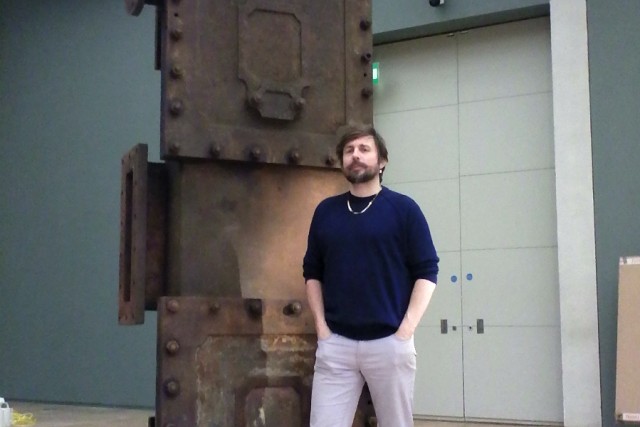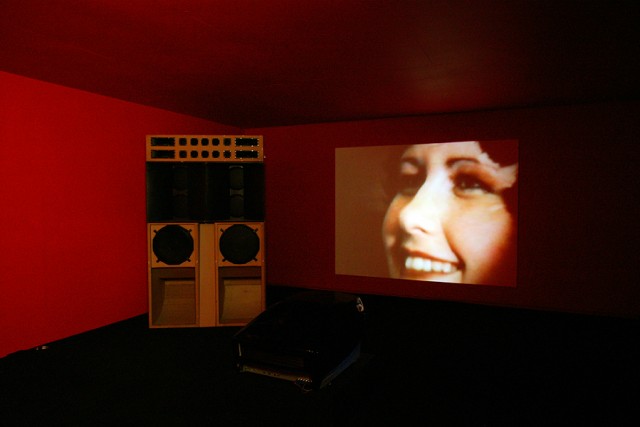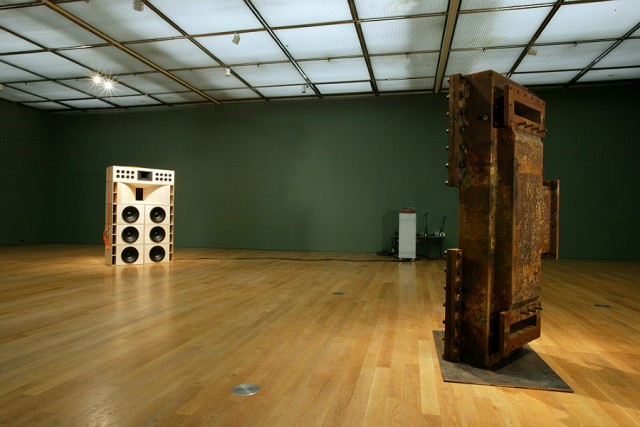Mark Leckey: Work and Leisure
We chat to the Turner Prize winning artist Mark Leckey about northerness, infamy and the Liverpool Biennial…
Mark Leckey is not really ready to be interviewed. Sleeves rolled up and kneeling on the floor alongside a small team of technicians, the Turner Prize winner is getting his hands dirty making last minute changes to his exhibition at Manchester Art Gallery. We’re not sure how many Turner Prize winners could be seen pitching in like this. But this self proclaimed ‘scally’ isn’t your average big-name artist.
Born in 1964 in Eastham, Ellesmere Port, Mark didn’t really get into art in school or feel like he knew what he was or what he was doing. “When I was there it was like an overspill area, always in the shadow in Liverpool.” Bored out of his brain as a teenager, and running round with casuals (a subculture of 80s crews who liked their fashion), he eventually got into art theory in his local library, starting him on the path to university and art glory.
Entitled Work and Leisure, this stripped-down exhibition has come directly from the Serpentine Gallery in London, but is showing here altered, and consciously more ‘northern’. Main pieces feature, such as Fiorucci Made Me Hardcore (video), but recognized piece BigBoxStatueAction is now known as BigBoxIndustrialAction: a ginormous steam mill engine looming opposite a equally huge speaker system. In Leckey’s performances, he blasts the mysterious object with ‘immense’ sounds. Maybe an obvious pun in the name, but a tried and tested way for Leckey to explore objects in his work: “it’s a means of communicating with an object that I’m not sure of…to find common ground with it”. In this case, attempting to help the steam mill engine (and us) to remember its past; quite literally, a lament to the passing of UK manufacture.
The references to Marks formative years spent in an 1980s an industrial northwest are easy to spot and quite nostalgic. The lads that feature in Fiorucci’, kitted out in late 70s fashions, preening and posturing in a horribly dated dancehall, are the lads Mark wanted to be whilst growing up in Ellesmere Port. He should’ve gone straight into working at Camel Lairds Ship yard, but got into club culture in the 80s as industry was dying. Making us linger on this hypnotic dancing in the film is a way for him to commemorate almost ritualistic behaviours from the time.
His winning 2008 Turner Prize exhibition, with a similar approach to pop culture and behaviours, was not understood and heavily criticised by the press. We were initially wary of interviewing Mark; our lingering perception was of that Guardian clip of him shouting at Jonathan Jones and being generally angry at how he was portrayed. What was the whole experience like, looking back? “I was kind of a bit surprised. I think that my work is immediate and not overly theory ridden, and it got talked about a lot about me being a very conceptual artist, and too academic.
“It’s a kind of weird roller-coaster. At the moment I’m feeling not that good about it in a way. I thought I should’ve won it, but in terms of me being…in terms of your contempories I think fine, that’s fair enough, I think I should be up there… but the Turner Prize comes across as if you’re somehow equivalent to the greats, and then I feel anxious, because it’s not, the Turner Prize isn’t saying that. You’re of that year and you did the best show. I think a lot of people get angry about the Turner Prize because it somehow suggests that you’re up there with Bacon or Hockney or whatever. I’m not at that stage.”
As an artist, getting written about so much in relation to a high profile exhibition must be great for opportunities and attention. But a negative media storm must be incredibly frustrating and potentially damaging. “That can cloud things. But then again if I hadn’t have won it or been nominated I would’ve been really pissed off! I thought that I was making stuff that deserved to be in the prize. The problem is, it’s not the type of hype that it once was. It has to be recognised as not that significant a thing. There aren’t that many artists working in Britain today…so at some point your time’s going to come. What everyone says about the art world being London focused and up its own arse isn’t that wrong.”
Sally Tallant, the new Artistic Director of Liverpool Biennial, has literally just moved up from London’s Serpentine Gallery. We’re wondering if Mark has met her and whether he thinks she’ll do a good job up here? “Well I know Sally, she’s great. She’s a proper powerhouse. I’ve talked to her since she got the job, and the things that she was thinking of doing for the Biennial sounded great to me, because to be honest I didn’t think a lot of it [Liverpool Biennial] before… I didn’t think it was up to much. The ambition she has for it sounds a lot more interesting.
“It always seems that the problem with the Biennial, the way it was set up before it had this kind of relational aesthetic – the idea that everyone can get involved. If you do that in Liverpool, then people DO want to get involved, to the degree where it can mess up the ‘artness’ of it!”
What do you think of the unfavourable comparisons with Manchester International Festival? “MIF wants to be a Künstler [Art Fair] in Europe, whereas Liverpool Biennial wants to be more local… Its in the nature of Liverpool to be involved, and that can be awkward in a way that I like. You can’t impose things on Liverpool.”
You can’t indeed. And despite the criticism, Leckey is a product of the city even if he feels somewhat detached from that, always as the outsider. Work and Leisure feels like a tentative reach for a reconnection with the north, with the cities that formed him, after a long career of international exhibitions. The whole show feels like a lament to the north and youth gone by, best experienced through the spectors dancing away an eternity in Fiorucci’, and through Mark himself during the sound performances, attempting to talk to his past.
Mark Leckey will be giving performances on Thur 1 March and Thur 8 March . All performances are at 6:45pm at Manchester Art Gallery and will last approximately 30 mins, free, no need to book.
Portrait by Natasha Johansson. All other images © 2012 Mark Leckey








